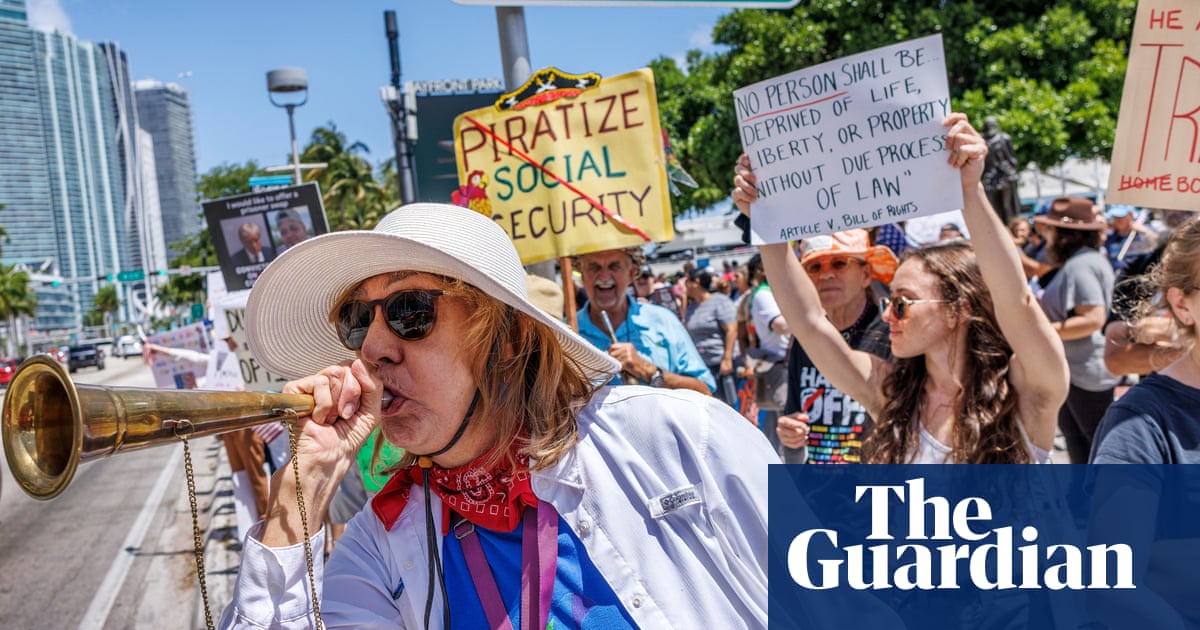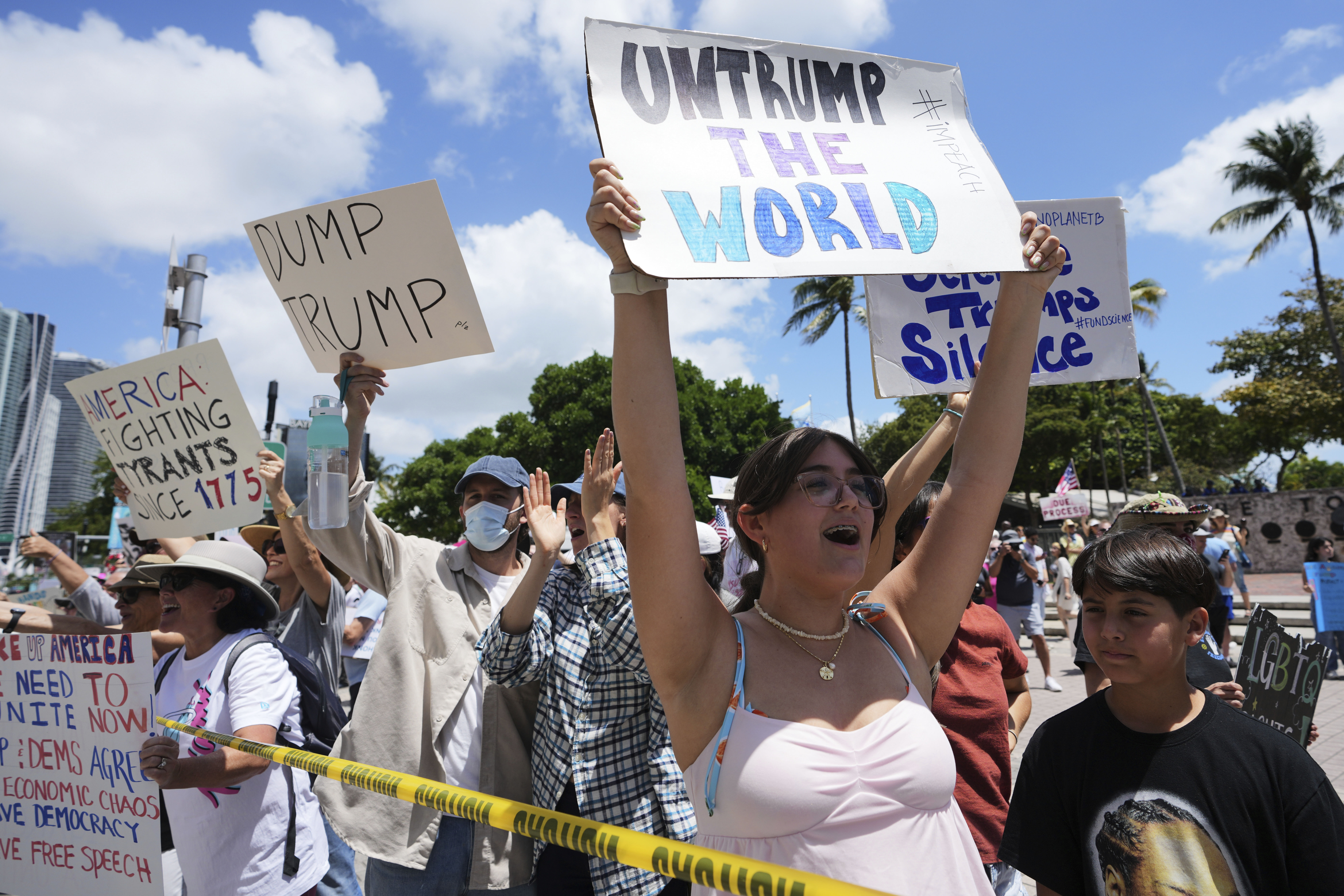Donald Trump’s executive orders targeting law firms and attorneys who challenge his priorities are roiling the legal community, with some capitulating to the administration’s demands amid mounting pressure the US’s biggest firms to speak out.
The president signed an executive order on Tuesday targeting the firm Jenner & Block over its previous employment of Andrew Weissman, a prosecutor who worked on Robert Mueller’s investigation into Trump’s connections to Russia. The order came after Trump issued similar executive orders targeting three other firms – Covington and Burling, Perkins Coie, and Paul, Weiss – over their representation of his political rivals.
Those orders have threatened to cripple the firms by revoking the security clearances of their lawyers, ending access to government buildings and forcing clients who do business with the government to disclose if they are represented by the firm. Trump also issued a separate executive order on Friday directing US attorney general Pam Bondi to investigate lawyers taking actions to block the administration’s priorities.
Scholars and experts say there is little doubt that Trump’s executive orders are a thinly-veiled effort to intimidate lawyers who might otherwise challenge the administration. The actions undermine a key element of the American democratic system by limiting the ability of potential adversaries to access the judicial system, one of the most powerful checks on executive power..
Trump got a huge boost last week when the firm Paul, Weiss accepted demands from Trump in exchange for withdrawing the executive order targeting the firm. The White House was gleeful at that result and the administration reportedly already has a list of other firms it may subject to similar treatment.
“Paul Weiss’s deal emboldened him to ratchet up his attack on one of the strongest checks on his power: lawyers and the rule of law,” David Perez, a partner at Perkins Coie wrote in a post on Sunday on LinkedIn. “Now more than ever law firms and lawyers across the political spectrum have to stand up for our timeless values.” Perkins Coie is suing the administration over the order and won a temporary restraining order blocking it.
U.S. District Judge Beryl Howell said during a hearing in the Perkins Coie suit that the order “sends little chills down my spine” and wrote in her ruling “such a circumstance threatens the very foundation of our legal system.”
Trump’s intimidation campaign may be working. There has been no unified response from the country’s biggest and most well-known law firms. “We waited for firms to support us in the wake of the President’s executive order targeting Paul, Weiss,” Brad Karp, the firm’s chairperson, wrote in an email to employees on Sunday. “Disappointingly, far from support, we learned that certain other firms were seeking to exploit our vulnerabilities by aggressively soliciting our clients and recruiting our attorneys.”
Former Biden administration officials are having trouble finding lawyers to represent them, the Washington Post reported. And civil rights and non-profit lawyers, who traditionally get pro-bono assistance from major firms, say there is a general wariness from big law firms on challenging the administration. And when firms do help, they want to keep it quiet and don’t want their names on publicly filed court documents.
Some firms also appear to be revising their web pages that detail their pro bono work. The firm Davis Polk, for example, appears to have recently removed references to racial justice and immigration from the pro bono page on its website, according to a Guardian review of an archived version of the page. As of 17 March, the firm’s pro-bono page included the statement: “We are proud to have a large team of full-time pro bono lawyers, with members focusing on litigation, corporate and transactional, racial justice, and humanitarian immigration matters.” Today, it no longer exists.
Davis Polk did not immediately return a request for comment on the changes.
The law firms’ fears are well founded. Elon Musk, a top Trump adviser, has already suggested targeting the firm Skadden, Arps, Slate, Meagher & Flom because of its pro bono work representing a Georgia man who was falsely accused of voter fraud in the film 2,000 Mules. The conservative filmmaker Dinesh D’Souza, who made the movie, apologized to Andrews last year, but nonetheless recommended targeting Skadden.
“Skadden Arps is the firm engaged in systematic lawfare against ‘2000 Mules.’ They have an army of 17 attorneys working pro-bono against me. I have 2 lawyers. The Left’s game is to ruin us through protracted, costly litigation,” he wrote on Twitter/X. Musk reposted the comment and said “Skadden this needs to stop now.”
The law firm Munger, Tolles & Olsen is said to be organizing an amicus brief joined by several other firms in support of Perkins Coie. It’s unclear, however, which firms will sign it and when it will be filed.
Some firms are also beginning to speak out separately.
“Our liberties depend on lawyers’ willingness to represent unpopular people and causes, including in matters adverse to the Federal Government,” Keker, Van Nest & Peters Partnership, a San Francisco-based firm, said in a statement on Saturday. “An attack on lawyers who perform this work is inexcusable and despicable. Our profession owes every client zealous legal representation without fear of retribution, regardless of their political affiliation or ability to pay.”
after newsletter promotion
Paul, Weiss has faced significant backlash after reaching an agreement with Trump to rescind the executive order. The agreement came days after Perkins Coie successfully got a court order blocking the executive order that targeted it.
More than 140 alumni of Paul, Weiss signed a letter to the law firm’s chairperson on Monday condemning the agreement the law firm reached with Trump last week and said it was complicit in “what is perhaps the gravest threat to the independence of the legal profession since at least the days of Senator Joseph McCarthy”.
“The very independence of lawyers and the legal profession is at stake. We are therefore profoundly saddened, and deeply outraged, that the firm in which we heretofore took pride has cowardly allowed itself to become instead a poster child for the administration’s efforts to silence dissent and impose a loyalty test on attorneys,” they wrote in the letter.
Rachel Cohen, an associate at Skadden, resigned after the Paul, Weiss agreement became public. She had organized an open letter signed by hundreds of lawyers urging major law firms to do more. Her resignation letter calling out Skadden for not doing more went viral.
“It’s a capitalistic cowardice,” she said. “It is fear for the bottom line of firms that already clear billions and billions of dollars a year in revenue.”
Deepak Gupta, a Washington-based appellate lawyer noted that the settlement itself also threatened to harm the firm’s reputation. “Would you want to be represented by a law firm that can’t even stand up for itself? a law firm that might sell you out to the federal government to save its own skin?,” he wrote in a post on the social media platform Bluesky.
In his email to employees on Sunday, Karp defended Paul, Weiss’s decision to reach an agreement with the Trump administration. The firm faced an “existential crisis”, he wrote, and the executive order could have “destroyed our firm”. The firm, he said, was guided by two principles in reaching the settlement: the firms’s obligation to its client’s interests and its fiduciary responsibility to its employees.
For a firm targeted by one of Trump’s executive orders, the economic consequences can be severe.
“Clients perceived our firm as being persona non grata with the Administration. We could prevent the executive order from taking effect, but we couldn’t erase it,” Karp wrote in his email to employees on Sunday. “Clients had told us that they were not going to be able to stay with us, even though they wanted to. It was very likely that our firm would not be able to survive a protracted dispute with the Administration.”
In its lawsuit challenging the executive order against it, Perkins Coie also detailed some of the financial toll the firm had taken. Nearly a quarter of the firm’s revenue was at risk – over $343m in 2024 – because of the executive order, the lawyers wrote. Trump announced the executive order on 6 March and by the time Perkins Coie sued over it five days later, at half a dozen – some who had been with the firm for years – had left the firm.
Marc Elias, a prominent Democratic election lawyer who has been targeted by Trump, issued a statement on Saturday that his firm would not negotiate with the White House over who it represented.
“President Trump is attempting to dismantle the constitution and attack the rule of law in his obsessive pursuit of retribution against his political opponents. Today’s White House Memo targets not only me and my law firm, but every attorney and law firm who dares to challenge his assault on the rule of law,” his statement said. “President Trump’s goal is clear. He wants lawyers and law firms to capitulate and cower until there is no one left to oppose his Administration in court.”

 German (DE)
German (DE)  English (US)
English (US)  Spanish (ES)
Spanish (ES)  French (FR)
French (FR)  Hindi (IN)
Hindi (IN)  Italian (IT)
Italian (IT)  Russian (RU)
Russian (RU)  3 weeks ago
3 weeks ago
























Comments